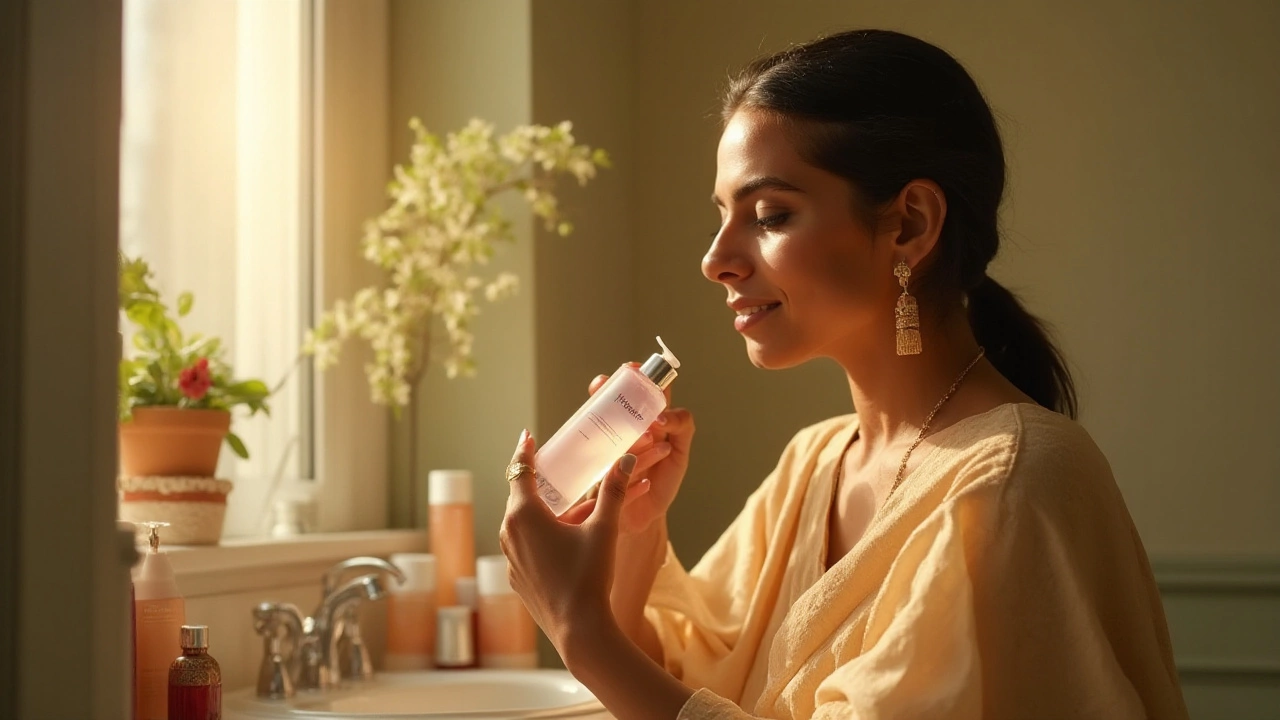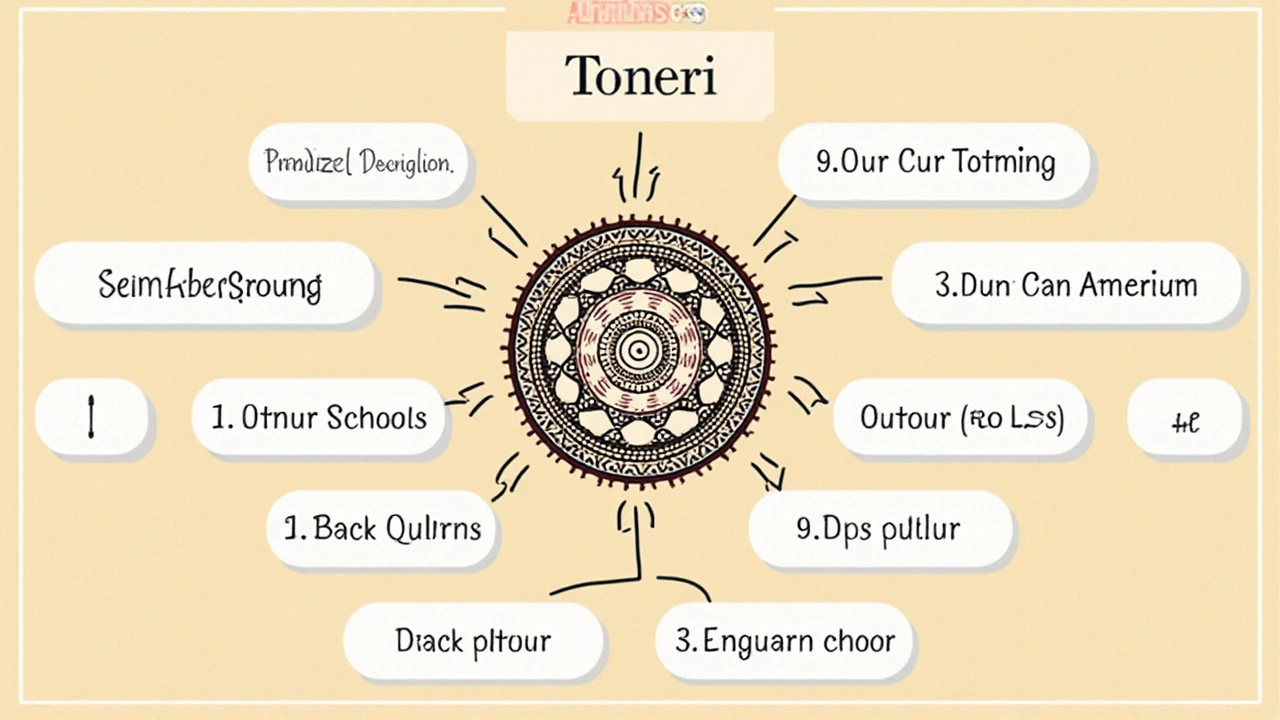
In the ever-evolving world of skincare, questions about which products are truly essential remain constant. The toner, an often-debated staple, sits at the center of these discussions. While some swear by its refreshing and refining properties, others view it as an unnecessary extra. This brings us to an intriguing query: is it okay to skip it altogether?
The role of toner in skincare has transformed over time. Initially designed to restore the skin's pH after cleansing, now its purpose often includes hydrating or delivering specific treatments to the skin. However, confusion looms about its necessity and whether its benefits justify including it in the daily regimen.
As you delve into this topic, consider your skin's unique type and lifestyle. Whether you're a minimalist or a skincare enthusiast, understanding when to embrace or forgo toner could lead you to the optimal skincare routine. Let's explore these concepts and help you decide if it's worth your time and investment.
- Understanding the Purpose of Toner
- Toner Ingredients and Benefits
- Arguments for Skipping Toner
- When Toner Might Be Essential
- Toner Alternatives in Skincare
- Crafting Your Personalized Skincare Routine
Understanding the Purpose of Toner
In the realm of skincare, toners play an intriguing role that has evolved over decades. Originally, toners were primarily used to restore the skin's pH balance after cleansing, especially when strong alkaline soaps were common. Given that the skin's natural pH tends to be slightly acidic, at around 4 to 5.5, cleansers could disrupt this balance. The idea was to help the skin revert to its optimal environment to function effectively. In addition, the standard formula of toners that existed years ago was predominantly alcohol-based, prioritizing controlling oil and removing any leftover residue from cleansers. However, the formulations and expectations from toners have significantly changed today.
Fast forward to the contemporary skincare world, and toners have diversified remarkably. Many products now boast hydrating and soothing ingredients like witch hazel, aloe vera, or hyaluronic acid. These variants are not just about pH balance but also about delivering moisture and prep for subsequent skincare steps. Some toners might even contain targeted treatments, offering antioxidants, or actives like alpha hydroxy acids (AHAs) or beta hydroxy acids (BHAs) to gently exfoliate the skin. A 2018 survey highlighted that two-thirds of respondents claimed their skincare routine included a toner as it provided them with visible benefits.
"Toners today are not merely an optional skincare step but a chance to deliver specific benefits unique to the skin type," comments Dr. Amy Wechsler, a renowned dermatologist. "For certain skin types, the right toner can add an extra layer of glow or calm, helping the skin's texture appear smoother and more refined."
Understanding when a toner is necessary hinges on recognizing the unique needs of your skin. If you have oily skin, a toner might help in reducing shine and tightening the pores. For individuals with dry skin, a moisturizing toner could be invaluable, replenishing lost hydration after washing the face. Those struggling with acne might find that certain acids in a toner help in managing breakouts more effectively. Yet, not everyone finds toner essential. Those with already balanced skin or a minimized skincare routine might skip it without noticing a difference. The key take-home message is that the purpose of using a toner today is more personalized than before, benefitting some more than others depending on individual skin concerns and preferences.
Toner Ingredients and Benefits
When diving into the world of toners, it's essential to understand what ingredients these magical little elixirs typically contain and what each component can do for your skin health. At times, toners may be overlooked, but their formulations reveal why they can be a valuable part of a skincare routine. Classic toners reflect their heritage with ingredients such as witch hazel, alcohol, and rose water, each serving various purposes. Witch hazel, known for its astringent properties, can help to soothe and tighten skin, reducing the appearance of pores. Similarly, rose water maintains moisture and provides a fresh, floral scent that has endeared it to many for generations.
In more modern concoctions, you might find an array of ingredients designed to target specific skin concerns effectively. Salicylic acid, a beta-hydroxy acid (BHA), is a prominent player in acne-fighting toners, delving deep into pores to clear them of blockages. On the other hand, toners with hyaluronic acid focus on hydrating and plumping the skin, catering to those battling dryness. Aloe vera and chamomile in toners have become popular for individuals with sensitive skin types, offering calming and anti-inflammatory effects, reducing redness and irritation.
Moreover, toner formulations are not only about the ingredients that clean and tone but also about what they exclude. Many reputable skincare brands are shifting towards alcohol-free formulas to prevent the drying effects traditional alcohol-based toners can have on the skin. In place of alcohol, you may find more gentle botanical extracts or hydrosols that focus on hydration rather than stripping the skin. This elegant balance of nature and science is crafting more inclusive products suitable for all skin types.
A well-known dermatologist once said, "Using a toner is like giving your skin a drink of water." This simple analogy captures the essence of what toners can provide—a refreshing and necessary dose of hydration and beneficial treatment, ensuring that your skin is prepped and ready to absorb follow-up products like serums and moisturizers more effectively.
Interestingly, toners have also evolved to include additional skincare benefits beyond mere cleansing and toning. Anti-aging ingredients such as antioxidants, including vitamin C and green tea extract, are often integrated into formulations to help fight free radical damage. If brightening and evening out skin tone are your goals, you may opt for toners with niacinamide or licorice root extract. These ingredients are known to improve the skin's overall complexion, making them a powerhouse addition to any beauty arsenal.
Exemplifying these functions, a contemporary approach to toners positions them not as a mere intermediary step but as active players in a comprehensive skincare routine. They work in tandem with other products, ensuring that the skin is balanced, hydrated, and prepped for any subsequent treatments. While some advocate for toner's usefulness based on personal success stories, ultimately, its role in your routine should be tailored to fit your individual skin needs. With the right toner, your beauty routine might not just be routine, but a rejuvenating experience tailored for your skin.

Arguments for Skipping Toner
In the diverse realm of skincare, skipping toner has become a point of consideration for many individuals seeking a streamlined beauty routine. Some enthusiasts argue that, with advancements in cleanser formulas and the richness of available moisturizers, toner may no longer be a crucial step. One of the primary arguments is centered on the composition of modern-day cleansers, which often maintain a balanced pH and remove impurities without stripping the skin. This reduces the traditional need for tonic post-wash and makes one question if skipping toner could be a more efficient choice.
Skincare experts have noted a shift over the years. Once, toner was essential to remove soap scum leftover from harsh cleansing agents. Today, with sulfate-free and milder cleansers, the need for toner has lessened significantly for some. Additionally, as toner sometimes includes alcohol-based ingredients, it can be drying for those with sensitive or dry skin types, which might prompt individuals to bypass it. As Dr. Emily Monson, a dermatologist, puts it:
"In the world of skincare, listening to your skin's reactions is paramount, and for many, skipping a step laden with potential irritants leads to healthier skin."
Another consideration is the argument for simplicity. Many individuals experience decision fatigue with expansive routines. By eliminating toner, one can simplify the regimen, focusing more on personalized treatments with serums or moisturizers that target specific needs. Also, for those who practice minimalism, cutting down unnecessary steps translates into a conscious effort to reduce environmentally impactful consumption, aligning with a more sustainable lifestyle. Eliminating unnecessary products can also be financially beneficial, allowing for investment in higher-quality targeted treatments.
Finally, the dermatological landscape has been shifting towards a customized approach, where not everyone needs the same set of products. Some viewpoints suggest focusing on understanding your skin type and selecting complementary products rather than adhering to a generic routine. Dr. Angela Hiroshi, a skincare specialist, often advises, "Evaluate your skin and lifestyle before investing in products. If your skincare concerns are addressed by other steps, toner might just be redundant." Key statistics show that over 35% of people surveyed have opted for simpler routines, reporting satisfaction and ease when eliminating certain steps like toner.
When Toner Might Be Essential
While it is certainly tempting to streamline skincare routines, there are specific situations where a toner becomes more than just an optional extra. One of the primary roles of a toner is to help balance the skin's pH levels. After cleansing, especially with harsh soaps or cleansers that disrupt the acid mantle, a toner can restore the skin’s natural pH. This is crucial for maintaining the skin barrier's protective functions. A balanced pH can prevent issues like dryness and breakouts, making toner essential if your water or cleansers leave skin feeling tight or irritated.
Beyond pH-balancing, toners packed with active ingredients play significant roles in targeting specific skin concerns. If your skin is prone to oiliness or acne, toners containing salicylic acid or witch hazel might help control sebum production and reduce blemishes. Similarly, for those confronting dullness, a toner infused with glycolic or lactic acid can offer gentle exfoliation, revealing brighter skin underneath. These particularly potent toners act as a daily mini-treatment, providing versatile options for addressing various skin issues.
"Toners can be invaluable for enhancing the penetration of subsequent treatments," shares a renowned dermatologist from HARO Skin Institute, indicating that a toner can serve as a primer for the rest of your skincare products.This means that by properly prepping the skin, toners may actually make serums and moisturizers more effective, particularly those containing heavy textures or potent active ingredients. Skincare enthusiasts who invest heavily in serums or treatments might therefore find toners indispensable.
In arid environments or during winter months, hydrating toners become essential to lock in moisture. Those with specific hydrating ingredients like glycerin, hyaluronic acid, or rose water soothe and hydrate parched skin. This can be particularly beneficial during transitional climates when the skin struggles to adapt. Utilizing a toner rich in nutrients provides a moisture boost when skin needs it most. Moreover, for individuals leading busy, urban lifestyles, antioxidant-rich toners can help fight environmental stressors and pollutants that speed up aging, providing essential protection for urban dwellers.
Skin Type and Environmental Factors
Skin type is paramount in dictating toner usage. Normal to oily skin types often benefit the most, but sensitive skin may need to be cautious, particularly with astringent variants. Sensitive skin individuals should opt for non-alcoholic, calming toners to avoid irritation. Environmental factors like living in an area with hard water can make toners crucial, as they help mitigate its drying effects by removing mineral residues left on the skin. If you notice your skin feels rough or stripped post-cleansing, introducing a toner might just be the missing puzzle piece in achieving a smoother, more balanced complexion.
If you find yourself grappling with any of these scenarios, leveraging the targeted benefits of toner may not only be beneficial but potentially essential to your skincare success. Like any good skincare practice, the decision should align with individual needs and lifestyle preferences, ensuring a routine that not only enhances but also complements your natural beauty. Ultimately, whether or not you choose to include a toner boils down to understanding what your skin is telling you and responding aptly to those cues.

Toner Alternatives in Skincare
In recent years, the beauty industry has witnessed a surge in products that promise to revolutionize your skincare routine, and as such, alternative options to traditional toners have emerged. These alternatives not only aim to fulfill the functions of toners, such as balancing skin pH and prepping the skin for further treatments, but they also provide additional benefits tailored to individual skin needs. For those questioning the necessity of a toner, exploring some of these alternatives can present a rewarding shift in their beauty regimen. One of the most popular alternatives is facial mists and essence waters, known for their hydrating capabilities which go beyond the basic properties of toner. With ingredients like hyaluronic acid and glycerin, these mists provide moisture and refreshment throughout the day. They are particularly beneficial for those with dry skin, creating a dewy, glowing complexion.
Another compelling substitute involves using serums that double down on specific skin concerns. Serums are packed with active ingredients like vitamin C, niacinamide, or retinol, designed to penetrate deeper layers of the skin, making them both a powerful treatment and a toner replacement. Many skincare experts advocate for serums as they are tailored to target specific issues, providing concentrated benefits. On occasion, combining a light serum with a good moisturizer is enough to keep the skin supple and balanced. There's also a new trend favoring alcohol-free astringents, which include natural ingredients such as witch hazel or rose water. These selections are favorable for those who wish to tighten pores without losing moisture or experiencing irritation. They have been a staple in soothing sensitive or acne-prone skin, maintaining the skin's integrity while controlling oil production.
"The key to a successful skincare routine is understanding your skin's unique needs," explains Dr. Terri Goldstein, a renowned dermatologist and skincare consultant.
Aside from specific products, some users are embracing the simplicity of distilled or floral water on cotton pads, which offers a gentle cleanse and refreshment without upsetting the skin's natural barrier. For others, natural ingredients found in their kitchen, such as green tea or cucumber slices, have become their go-to for a natural toner substitute. These DIY options not only utilize antioxidants and calming effects but also bring a personal touch to self-care routines, effectively realigning with the skin's chemical balance and reducing inflammation.
For the tech-savvy skincare enthusiast, gadgets like skin scrubbers and steamers introduce a futuristic approach by facilitating deeper cleansing and product penetration, which can potentially replace toner use. At-home devices enhance absorption of other skincare products, ensuring the skin is adequately prepped and in prime condition for other beauty treatments. By creating an environment conducive to absorption, these alternatives offer more than what a traditional toner might achieve, encouraging users to think creatively about their skincare choices. Despite the plethora of options available, selecting an appropriate alternative depends on understanding one's skin type, goals, and environmental factors. Adopting or substituting products should be thoughtfully considered based on individual needs and preferences. Whatever avenue you choose, the journey to exploring toner substitutes can be both enlightening and beneficial to your skin's health.
Crafting Your Personalized Skincare Routine
Creating a skincare routine that's tailored to your unique needs is more than just a self-care ritual; it's an investment in your skin's health over the long term. This means recognizing that everyone's skin is different, influenced by factors like genetics, age, climate, and even diet. To begin crafting a personalized skincare routine, start by identifying your skin type: oily, dry, normal, combination, or sensitive. Each type dictates different care, so it's essential to choose products and regimens that cater to your specific needs.
Once you've pinpointed your skin type, consider your primary skin concerns. Are you dealing with acne, aging, hyperpigmentation, or dehydration? Identifying these challenges will guide you in selecting products that target these issues. For instance, if anti-aging is at the top of your list, look for serums rich in retinol or peptides. Alternatively, if dryness plagues you, a hydrating hyaluronic acid serum might just be your skin's hero product.
Understanding the science behind skincare is equally important. Experts suggest incorporating a three-step routine—cleanse, treat, and moisturize—as a foundation. While embellishments like masks and exfoliators can offer additional benefits, the basics are non-negotiable. Cleansing prepares the skin by removing dirt and oils, treatment involves addressing specific concerns, and moisturizing locks in necessary hydration. These should act as the backbone of daily rituals, ensuring your skin receives consistent care.
"A good skincare routine is like a good recipe. All the ingredients are there for a reason, working together to nourish and protect your skin," says Dr. Mary Page, a renowned dermatologist.
Pay attention to how your skin reacts to specific products. Sometimes, what works beautifully for one person may not yield the same results for another. Begin with patch testing new products to avoid adverse reactions. This can be crucial for products with active ingredients like alpha hydroxy acids—which offer benefits but can be potent on sensitive skin.
The environment plays a significant role in deciding the products you use as part of your skincare routine. For instance, those living in humid climates might opt for lighter, oil-free moisturizers, while those in colder terrains might benefit from richer, emollient formulas. Adjust your routine with the seasons to provide what your skin needs at different times of the year.
Don't forget to incorporate sun protection into your daily regimen. UV rays don't take breaks, and protection should be non-negotiable. Choose a broad-spectrum SPF of at least 30, even on cloudy days, and apply it liberally. Consider it your skin's best defense against premature aging and other UV-related concerns.
Consistency is key. As much as finding the right products is important, so is sticking to your routine daily. Change often comes slowly and over time, so patience is an integral part of seeing results. As your skin changes over time, so should your approach. Listen to what it needs and adapt accordingly, ensuring your skincare practice evolves as you do.
 Hair Care
Hair Care